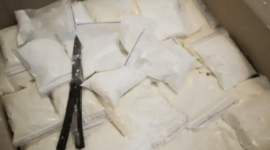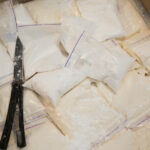What Amounts to a ‘Large Commercial Quantity’ of Prohibited Drugs in New South Wales?

Police have charged a 19-year old man with a serious drug offences after 120 kilograms of cocaine with an estimated street value of $60 million was allegedly discovered in a shipping container at Port Botany in Sydney.
Manner of detection
Police say they were called to the premises of a shipping container logistics company at around 11pm on 25 May 2023 in response to a reported break and enter.
Officers from Eastern Beaches Area Command attended the scene and took over from security guards who had detained a 27-year old man found inside the premises.
The security officers told police a second man had fled the scene.
The 27-year old was conveyed to Newtown Police Station where he was charged with entering inclosed lands, assault, assault occasioning actual bodily harm and causing intentional or reckless damage.
He was refused bail at the police station as well as later when he appeared in Waverley Local Court.
The Australian Border Force examined the shipping container into which the man gained entry, located 120 one-kilogram blocks of cocaine.
‘Rip on, rip off’
The matter was then taken over by Strike Force Biles, a specialist unit set up earlier this year to investigate the supply of large commercial quantities of prohibited drugs using the “rip on, rip off” method.
This is a method whereby a legitimate cargo shipment is exploited to smuggle drugs – that is the drugs are hidden amongst the cargo – which can be anything from furniture or building supplies to fabrics and foodstuffs.
In these cases, neither the shipping company, nor the consignee who is responsible for the legitimate shipment is aware that they are being used to transport drugs, and it is said to be a popular method used by drug smugglers to move large quantities of illicit substances around the globe.
A report published in the Tradewinds Global Shipping News Magazine earlier this year suggested that gangs have become so sophisticated at using this illegal method of transport, they can open a container and remove 100 kgs of cocaine in less than three minutes.
Man charged with supplying a large commercial quantity of prohibited drugs
Further investigation led to the search of three residential units in the Balmain and Leichhardt areas, during which police say they located a number of items suspected of being used to break into shipping containers, including crowbars, gloves and bags.
A 19-year old man was arrested as a result and charged with large commercial supply of prohibited drugs and attempt to possess a commercial quantity of border restricted drug.
He was also been refused bail and will appear in court again in July.
Police allege that both of the arrested men travelled from Greece to specifically “rip off” the drugs on behalf of a local syndicate.
The offence of supplying a prohibited drug in New South Wales
Supplying a prohibited drug is an offence under section 25 of the Drug Misuse and Trafficking Act 1985 (NSW).
To establish the offence, the prosecution must prove beyond reasonable doubt that:
- You supplied, or knowingly took part in the supply of, a substance,
- The substance was a prohibited drug, and
- You knew, or believed at the time, that the substance was a prohibited drug.
To ‘supply’ means:
- To sell or distribute,
- To agree or offer to supply,
- To keep or possess for supply,
- To send, forward, deliver or receive for supply, or
- To authorise, direct, cause, suffer, permit or attempt any of the above.
To ‘knowingly take part in supply’ means:
- To take or participate in any step of the supply process, or causing any such step to be taken,
- To provide or arrange finance for any step in the supply process, or
- To provide the premises for any step in the supply process, or suffer or permit any such step to be taken in a premises for which the person is the owner, lessee, occupier or manager.
What is a large commercial quantity of drugs in NSW?
The large commercial quantity of some of the most commonly prosecuted drugs in New South Wales is as follows:
| Drug Type | Large Commercial Quantity |
| Ecstacy (MDMA) | 500grams |
| Cocaine | 1kg |
| Amphetamines | 1kg |
| Heroin | 1kg |
| Cannabis | 100kg |
What is the maximum penalty for large commercial supply of a prohibited drug in NSW?
The maximum penalty for large commercial supply of a prohibited drugs is life in prison and/or 5000 penalty units.
The value of a penalty unit for a New South Wales offence is $110 at the time of writing, which means the maximum fine for the offence is $550,000.
Legal defences
Although all general legal defences such as self-defence, necessity and duress apply to commercial drug supply cases, the most frequently available is the latter mentioned defence – duress.
The defence applies where you engaged in the conduct:
- Due to a threat of death or serious injury to you, or to a close family member,
- There was no reasonable way for your to render the threat ineffective, and
- Your conduct was a reasonable response to the threat.
Where any evidence of a defence is raised, the prosecution must then prove beyond reasonable doubt that the defence does not apply.
If they are unable to do so, you are entitled to an acquittal.
Going to court for drug supply?
If you have been accused of drug supply, contact Sydney Criminal Lawyers anytime on (02) 9261 8881 to secure the services of exceptional criminal defence lawyers with an outstanding track record of receiving optimal results in serious drug cases.
Our experienced team has developed techniques over more than 20 years to defend and win serious and complex drug cases, and some of our notable victories include winning Australia’s largest ever heroin importation trial – where all three of our clients were found not guilty, while the remaining three co-accused, represented by other criminal law firms, were found guilty.
We have achieved bail in circumstances that appeared insurmountable, such as when our clients were allegedly caught importing 300kgs of drugs, and in several other cases where the co-accused, represented by other law firms, were refused bail.
We often win cases after clients have seen other criminal lawyers who have advised them to plead guilty, through our in-depth knowledge of the applicable laws and procedures, meticulous preparation, proactively building defence cases (rather than simply adjourning cases to await prosecution materials), and implementation of effective defence strategies.








